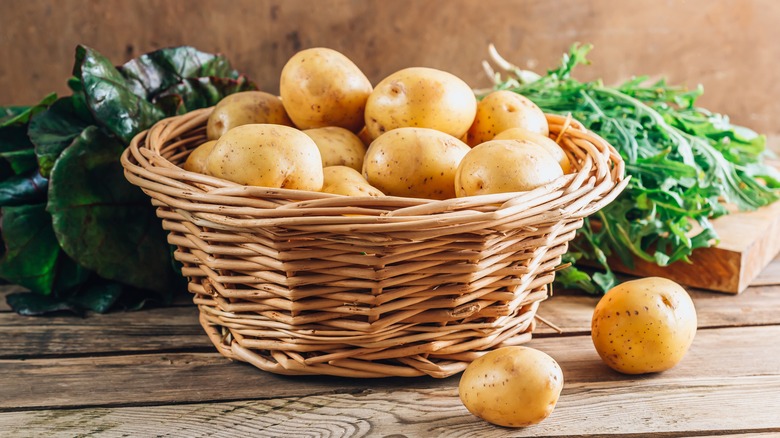Researchers May Have Found A Way To Improve Potato Digestion
Potatoes are one of the most versatile foods and a fantastic addition to many dishes. They make great fries, are a hearty addition to casseroles, and mashed potatoes are always a favorite dinner side dish.
Potatoes are low-calorie, contain antioxidants, vitamins C, B6, and potassium, and their skins are rich in fiber, which can be beneficial for digestion (via WebMD). In fact, WebMD also reports that the fiber found in potatoes is a "resistant starch," which provides the benefits of both soluble and insoluble fibers and acts as a prebiotic. However, Livestrong states that eating too many skin-on potatoes can leave you feeling bloated and uncomfortable if you are not used to eating fiber.
Since the body digests the carbohydrates in potatoes quickly, WebMD says the digestion process can create a quick spike in blood sugar. But researchers may have discovered a way to slow the rate of digestion, reducing that risk of increased blood sugar.
This process could slow digestion
This new potato processing technique will help digestive enzymes reach the potato starch more slowly, making for a slower release of dietary glucose, reports EurekAlert. To test this hypothesis, researchers at the Singapore Institute of Food and Biotechnology Innovation (SIFBI) at A*STAR diced potatoes and placed them in hot water alongside a food-safe ingredient. They report that after half an hour, a porous, protective layer was created on the potatoes, allowing the starch to slowly degrade.
EurekAlert states that this process essentially pre-cooks the potatoes, so big batches of these treated potatoes should be frozen if they're not being cooked and eaten right away. The researchers also suggest that this could help people avoid overeating by helping them feel fuller for longer (via EurekAlert).
This new method can help make digesting potatoes easier, and safer for anyone who needs to keep an eye on their blood sugar. Though it is still in testing, initial taste tests showed positive results, and the researchers are hoping to head to clinical trials soon.

